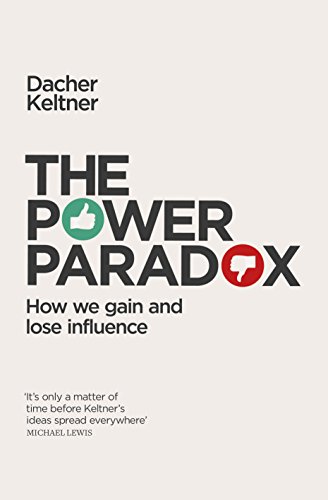Items related to The Power Paradox: How We Gain and Lose Influence

A revolutionary rethinking of everything we know about power
It shapes every interaction we have, whether we're trying to get a two-year-old to eat green vegetables or ask for a promotion at work. But how do we really gain power? And what does it do to us?
As renowned psychologist Dacher Keltner reveals, the new science of power shows that our Machiavellian view of status is wrong. Influence comes not to those who are ruthless, but to those with socially intelligence and empathy. Yet, ironically, the seductions of success lead us to lose those very qualities that made us powerful in the first place. Keltner draws on fascinating case studies to illuminate this 'power paradox', revealing how it shapes not just companies and elections but everyday relationships. As his myth-busting research shows, power - and powerlessness - distorts our behaviour, affecting whether or not we will have an affair, break the law, drive recklessly or find our purpose in life.
In twenty original 'power principles', Keltner shows how we can retain power by maintaining a focus on others. By redefining power as the ability to do good, The Power Paradox turns everything we know about influence, status and inequality upside down.
"synopsis" may belong to another edition of this title.
Lively and intriguing ... The Power Paradox delivers a much-needed dose of positivity in the study of how managers and leaders can get the best out of their workers and populations (Prospect)
The Westminster old guard sat all around him may not realise it, but Dacher Keltner and his ideas may pose a severe challenge to their way of doing business. And it gets worse: as he and his cohorts render them obsolete, they will rub it in by being nice to them (Archie Bland Guardian)
Dacher Keltner is the most interesting psychologist in America. He's busy changing the minds of Americans about how power works, how inequality works. It's only a matter of time before his ideas spread everywhere. And unlike most psychologists I know, he's not a weirdo (Michael Lewis, author of 'The Big Short', 'Flash Boys', and 'Boomerang')
The Power Paradox brings clarity to our confusion, brimming with evidence-based insights into powerlessness, the selfish uses of power, and the best kind: power that furthers the greater good. Dacher Keltner's brilliant research gives us a lens that lets us see afresh hidden patterns in society, politics, and our own lives. No doubt this will be one of the most significant science books of the decade (Daniel Goleman, author of 'Emotional Intelligence' and 'A Force for Good: The Dalai Lama’s Vision for Our World')
Keltner shares insights into many aspects of power, including afternoon tea in Britain and how Lincoln won the presidency. His combination of academic sophistication and clear style delivers a new concept of power in our society today that is provocative and intriguing (Sheryl WuDunn, Pulitzer Prize-winning journalist and author of 'Half the Sky: How to Change the World')
That power is not taken but given is true for most human relations today. It has ancient roots in primate behavior. Dacher Keltner applies a lifetime of research to this topic, offering a lively description of how true power is like a return on a social investment in others (Frans de Waal, author of 'Are We Smart Enough to Know How Smart Animals Are?')
With personal insight and the latest science, Keltner is both realistic and idealistic: The Power Paradox sheds light on human power's dark side, as well as its redeeming qualities. Everyone can learn from this wise book (Susan T. Fiske, Professor of Psychology at Princeton and author of 'Social Cognition')
Dacher Keltner's focus on power as doing good for others is a refreshing change from a Machiavellian perspective and helps us to better understand what the - much more fulfilling - target of ambition should be (Kate Pickett, co-author of 'The Spirit Level')
'Dacher Keltner is the most interesting psychologist in America' Michael Lewis
'Keltner's brilliant research gives us a lens that lets us see afresh hidden patterns in society, politics, and our own lives. No doubt this will be one of the most significant science books of the decade' Daniel Goleman, author of Emotional Intelligence
'His combination of academic sophistication and clear style delivers a new concept of power in our society today that is provocative and intriguing' Sheryl WuDunn, Pulitzer Prize-winning journalist and author of Half the Sky: How to Change the World
'Dacher Keltner applies a lifetime of research to this topic, offering a lively description of how true power is like a return on a social investment in others' Frans de Waal, author of Are We Smart Enough to Know How Smart Animals Are?
'Everyone can learn from this wise book' Susan T. Fiske, Professor of Psychology at Princeton and author of Social Cognition
"About this title" may belong to another edition of this title.
- PublisherAllen Lane
- Publication date2016
- ISBN 10 0241256682
- ISBN 13 9780241256688
- BindingPaperback
- Edition number1
- Number of pages208
- Rating
Shipping:
FREE
Within U.S.A.
Top Search Results from the AbeBooks Marketplace
The Power Paradox
Book Description Paperback. Condition: As New. No Jacket. Pages are clean and are not marred by notes or folds of any kind. ~ ThriftBooks: Read More, Spend Less 0.5. Seller Inventory # G0241256682I2N00

